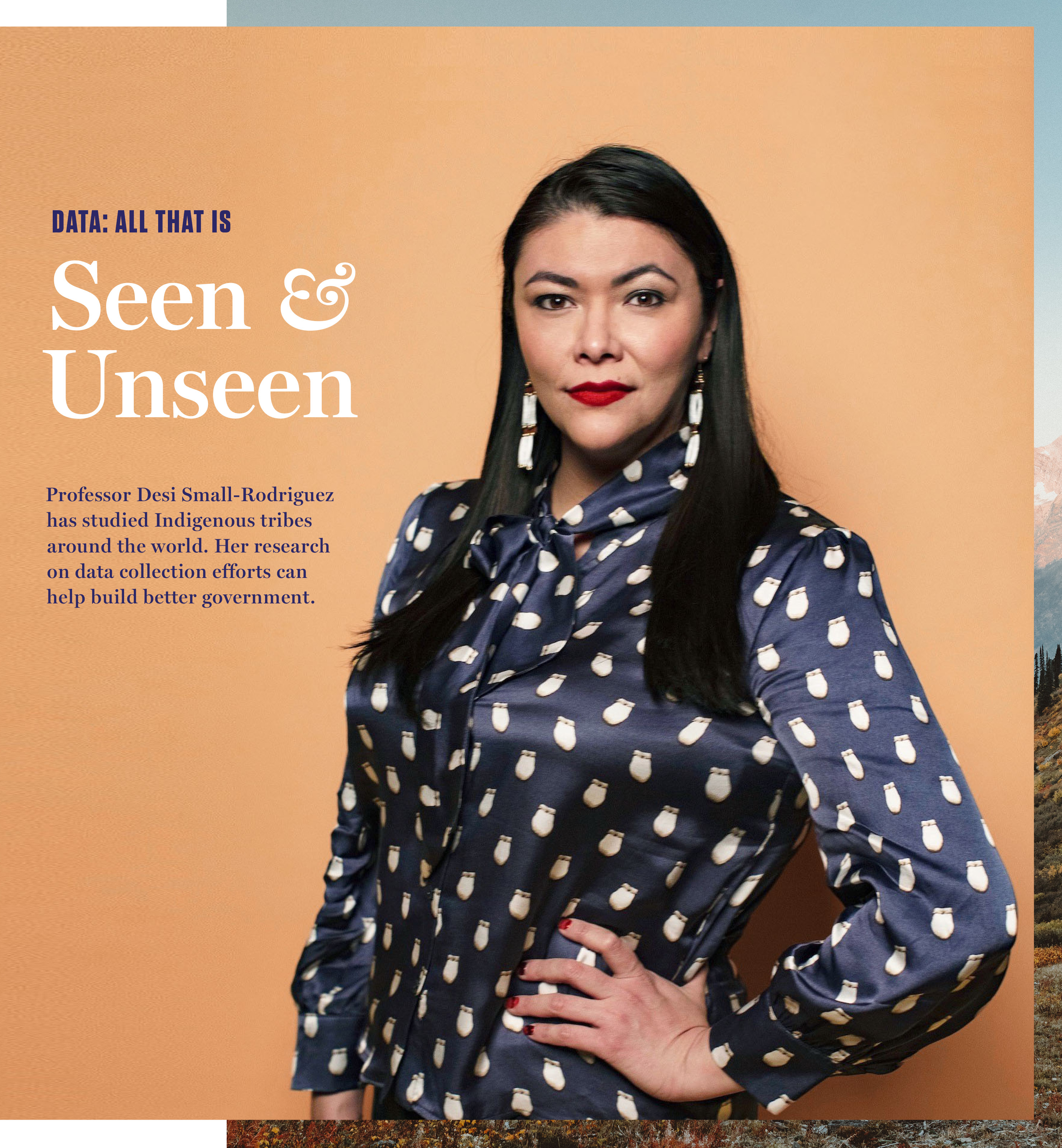Advancing Equality with Better Data

By Elizabeth Kivowitz | Photo by Matika Wilbur
A proud Northern Cheyenne Indian and Chicana, Desi Small-Rodriguez says that she’s a relative first, then a researcher and teacher, and thus considers herself a bit of an anomaly in academia.
“I need to remain accountable to my community,” said Small-Rodriguez, an assistant professor of sociology and Amer-ican Indian studies in the UCLA College and the first Indigenous woman to be jointly hired by the sociology department and the American Indian studies program. “That’s how many Indig-enous faculty feel. Academia can take you far away from the communities, lands and waters that ground you. I’m consistently reminded by mentors, ‘Always lift as you climb,’ because this is such a lonely path.”
In her research Small-Rodriguez examines those on the periph-ery of mainstream data collection efforts like government surveys and the U.S. Census, to understand the ways people in these groups are or are not being counted. She says these efforts often do a poor job of collecting data on Indigenous peoples, undocu-mented migrants, those experiencing homelessness, the LGBTQ community and other marginalized groups, which causes harm and perpetuates inequality.
“The U.S. is the most unequal country of any of the developed countries in the world,” said Small-Rodriguez, who joined the UCLA faculty last fall. “I’m interested in how systems amplify suf-fering and why suffering is being disproportionately experienced by certain populations, and also systems of erasure and how erasure perpetuates inequality. If your literal presence is com-pletely erased, that is a unique form of inequality and injustice.”
MAKING DATA WORK TO BUILD EQUITY
Small-Rodriguez sees wide-ranging applications for her work that could drive systemic change in how data collection efforts are organized and operated – leading to better government decision-making and policy.
“Ultimately, I’m an optimist. I believe that just as structures of inequality were built and maintained, so too can they be dismantled and replaced,” Small-Rodriguez said. “And like most Indigenous scholars, I am called upon to work, advocate and serve in different directions. Being a professor is simply one of my dream jobs. I have many paths that will sustain me, and I believe that eventually all roads lead home.
“This means that part of my work in academia includes making myself literally obsolete. I want to train enough young scholars to take over this work, so that one day I can be back full-time on my homelands living the Cheyenne way of life in good relation with all that is seen and unseen.”
With her move to Los Angeles delayed due to the pandemic, Small-Rodriguez resides on the Northern Cheyenne reservation in Montana where she grew up. Over the past few months, she has been encouraging people in her community to get vaccinated against COVID-19, especially given the disproportionate impact of the virus on Indigenous peoples early in the pandemic.
“I’m thankful for all the brave and amazing frontline medical workers and our tribal leaders who continue to exercise tribal sovereignty so that we can get all of our people vaccinated regardless of age or health status,” she said.
Small-Rodriguez also co-hosts “All My Relations,” the mostpopular podcast in the Indigenous world with more than 1 million downloads.
A LEAP OF FAITH INTO DEMOGRAPHY
As a student, Small-Rodriguez became interested in demography and social science because her sociology professor, one of the only Indigenous sociologists and demographers in the world, noticed her abilities in the field. He offered her a job with a Māori doctoral student he was advising who was doing research in New Zealand. She learned how to be a researcher and demographer working for tribes in New Zealand for many years, and then con-ducting the same type of work for tribes in the U.S.
“My time in New Zealand was life changing,” she said. While there, Small-Rodriguez worked on tribal census projects, community surveys, and social determinants of health and policy research. “It’s where I learned how to do research and build data by Indigenous Peoples for Indigenous Peoples. I also learned about the boundaries of indigeneity and tribal belonging in ways that are far different than for Indigenous Peoples in North America. In New Zealand, Māori kinship is affirmed in very inclusive ways as compared to minimum blood quantum policies that we use here. That led to another area of my research understand-ing the boundaries of belonging for Indigenous peoples.”
Small-Rodriguez points out that the word data comes from the Latin “datum,” meaning something given. For Indigenous Peoples, the term more often means “something taken” – and that data has been used as another method by which others extract some-thing from the Indigenous, leaving behind very broken systems to rebuild and repair. She references everything from Indigenous bodies, to language, to knowledge of the important connections with lands, water and animals as having become disrupted. She calls that “data erasure” an ongoing effort of genocide.
Amid all the loss, the recent vaccination effort illustrates an area of hope. “The only reason that Indigenous Peoples now have some of the highest rates of vaccination uptake is because of tribal sovereignty,” Small-Rodriguez said. “Tribes exercised sovereignty and have been able to protect their people in ways federal, state and local governments have not. Tribal sovereigns know how to get their people onboard because of their deep commitment to collective survival. In Indigenous communities, we are born and raised with a collective survival strategy, and we’ve been doing this since we were invaded 500 years ago. This is something that we have seen shine through in the middle of this pandemic — something positive amidst so much negative.”
LEARN MORE
Listen to the “All My Relations” podcast co-hosted by professor Small-Rodriguez.
Back to UCLA College Magazine page



